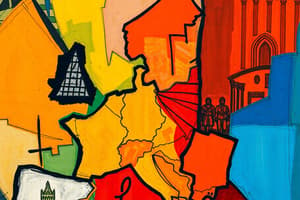Podcast
Questions and Answers
What event in 1453 marks the end of the medieval period?
What event in 1453 marks the end of the medieval period?
The Fall of Constantinople.
In what year did Gutenberg’s Printing Press revolutionize knowledge dissemination?
In what year did Gutenberg’s Printing Press revolutionize knowledge dissemination?
Which two significant events occurred in 1492 that signified the beginning of the modern age?
Which two significant events occurred in 1492 that signified the beginning of the modern age?
The discovery of America and the fall of Grenada.
What significant political entity was formed by the Union of Lublin in 1569?
What significant political entity was formed by the Union of Lublin in 1569?
Signup and view all the answers
What major conflict ended in 1648, reshaping Europe’s political and religious landscape?
What major conflict ended in 1648, reshaping Europe’s political and religious landscape?
Signup and view all the answers
What document, enacted in 1791, is regarded as Europe's first modern constitution?
What document, enacted in 1791, is regarded as Europe's first modern constitution?
Signup and view all the answers
What impact did the Napoleonic Wars (1804-1815) have on Europe, particularly Poland?
What impact did the Napoleonic Wars (1804-1815) have on Europe, particularly Poland?
Signup and view all the answers
Discuss the significance of the fall of Constantinople in 1453 and its implications for the medieval period.
Discuss the significance of the fall of Constantinople in 1453 and its implications for the medieval period.
Signup and view all the answers
How did Gutenberg’s Printing Press transform the dissemination of knowledge in the 15th century?
How did Gutenberg’s Printing Press transform the dissemination of knowledge in the 15th century?
Signup and view all the answers
Analyze how the events of 1492, particularly the discovery of America and the fall of Grenada, catalyzed the transition to the modern age.
Analyze how the events of 1492, particularly the discovery of America and the fall of Grenada, catalyzed the transition to the modern age.
Signup and view all the answers
Evaluate the impact of the Partitions of Poland on the nation's sovereignty and identity in the late 18th century.
Evaluate the impact of the Partitions of Poland on the nation's sovereignty and identity in the late 18th century.
Signup and view all the answers
What were the major outcomes of the American Declaration of Independence in 1776, influenced by Enlightenment ideals?
What were the major outcomes of the American Declaration of Independence in 1776, influenced by Enlightenment ideals?
Signup and view all the answers
Discuss the cultural and political repercussions of the French Revolution from 1789-1799 across Europe.
Discuss the cultural and political repercussions of the French Revolution from 1789-1799 across Europe.
Signup and view all the answers
What were the significant repercussions of the Congress of Vienna in 1815 for Europe’s political landscape?
What were the significant repercussions of the Congress of Vienna in 1815 for Europe’s political landscape?
Signup and view all the answers
Flashcards
Fall of Constantinople (1453)
Fall of Constantinople (1453)
The fall of the Byzantine Empire to the Ottoman Empire in 1453. It marked the end of the medieval period and the beginning of Early Modern European history.
Gutenberg's Printing Press (1455)
Gutenberg's Printing Press (1455)
The Gutenberg Press, invented in 1455, revolutionized the dissemination of knowledge and helped spread literacy across Europe.
Discovery of America (1492)
Discovery of America (1492)
The discovery of America by Christopher Columbus in 1492. It also marks the fall of the Kingdom of Granada, a Muslim kingdom in Spain, which marked the completion of the Reconquista. This event connected Europe, Africa, and the Americas, marking a significant turning point in history.
Polish-Lithuanian Commonwealth (1569)
Polish-Lithuanian Commonwealth (1569)
Signup and view all the flashcards
Thirty Years' War (1618-1648)
Thirty Years' War (1618-1648)
Signup and view all the flashcards
The Swedish Deluge (1655-1660)
The Swedish Deluge (1655-1660)
Signup and view all the flashcards
Battle of Vienna (1683)
Battle of Vienna (1683)
Signup and view all the flashcards
American Declaration of Independence
American Declaration of Independence
Signup and view all the flashcards
French Revolution
French Revolution
Signup and view all the flashcards
Partitions of Poland
Partitions of Poland
Signup and view all the flashcards
Napoleonic Wars
Napoleonic Wars
Signup and view all the flashcards
Congress of Vienna
Congress of Vienna
Signup and view all the flashcards
Revolutions of 1848
Revolutions of 1848
Signup and view all the flashcards
Constitution of May 3rd
Constitution of May 3rd
Signup and view all the flashcards
Study Notes
Key Events in European History
- 1453: Fall of Constantinople, marking the end of the medieval period.
- 1455: Gutenberg's Printing Press revolutionized knowledge dissemination.
- 1492: Discovery of America and the fall of Granada, ushering in the modern age.
- 1569: Union of Lublin formed the Polish-Lithuanian Commonwealth.
- 1648: End of the Thirty Years' War reshaped Europe's political and religious landscape.
- 1655-1660: The Deluge, a devastating Swedish invasion of the Commonwealth.
- 1683: Battle of Vienna, where Jan Sobieski defeated the Ottoman Empire.
- 1776: American Declaration of Independence, influenced by Enlightenment ideals.
- 1789-1799: French Revolution, overthrowing the monarchy and establishing a republic.
- 1791: The Constitution of May 3rd, Europe's first modern constitution, attempted to reform the Commonwealth.
- 1772, 1793, 1795: Partitions of Poland by Prussia, Austria, and Russia ended Polish sovereignty.
- 1804-1815: Napoleonic Wars reshaped European borders and fueled Polish independence movements.
- 1815: Congress of Vienna established a conservative order in post-Napoleonic Europe.
- 1848: Wave of liberal uprisings across Europe (Revolutions of 1848).
Studying That Suits You
Use AI to generate personalized quizzes and flashcards to suit your learning preferences.
Description
Explore the pivotal events that shaped Europe from the fall of Constantinople in 1453 to the French Revolution. This quiz covers significant milestones such as the invention of the printing press, the establishment of the Polish-Lithuanian Commonwealth, and the American Declaration of Independence. Test your knowledge of these transformative moments in European history.




